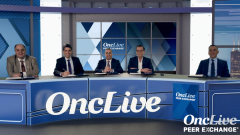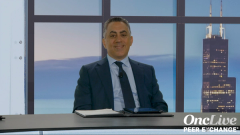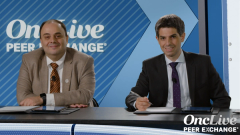
Patient Profile 2: Frontline Therapy for Advanced HCC

Centering discussion on a patient with advanced-stage HCC, expert panelists discuss the frontline use of atezolizumab + bevacizumab as a standard of care.
Episodes in this series

Transcript:
Tanios Bekaii-Saab, MD: Dr El-Khoueiry, please present patient profile No. 2.
Anthony El-Khoueiry, MD: Our second case is a 63-year-old woman who has chronic active hepatitis C infection. She was recently started on antiviral therapy and presented with elevated liver function tests. That triggered a CT scan of the abdomen, which showed multifocal infiltrative liver lesions in the right lobe. There was an enhancing as well, tumor thrombus in the right posterior portal vein. This is evidence of vascular invasion by the tumor and a separate bland thrombus at the splenic confluence and SMV [superior mesenteric vein] and a nodular surface of the liver consistent with cirrhosis.
The platelet count was low, consistent with portal hypertension at 68,000 per mm3. AFP [alpha-fetoprotein] was 5000 ng/mL, bilirubin 1.3 was mg/dL, albumin was 3.7 g/dL, AST [aspartate aminotransferase] was 76 U/L, ALT [alanine aminotransferase] was 112 IU/L, and hepatitis C RNAs were detectable at 1 million [units transferred]. The patient was diagnosed based on imaging criteria with hepatocellular carcinoma. The patient must have shown arterial phase enhancement on the scans with venous phase washout to meet the standard imaging criteria for diagnosis. The patient has Child-Pugh A disease and an excellent performance status: with ECOG 0.
Tanios Bekaii-Saab, MD: It’s a straightforward case. Pierre, how would you treat this patient?
Pierre Gholam, MD: This patient has Child-Pugh A cirrhosis. She is a prototypical BCLC-C [Barcelona Clinic Liver Cancer stage C] patient, with a tumor invading a large blood vessel. She doesn’t appear to have any significant contraindications to the combination of atezolizumab and bevacizumab, so based on the evidence, that would be our go-to first-line model.
Tanios Bekaii-Saab, MD: What would make you reluctant to consider atezolizumab-bevacizumab in such a patient?
Pierre Gholam, MD: There’s a concern when combining these agents for risk of bleeding, primarily related to portal hypertension. One would be well advised to assess portal hypertension risk in this Child-Pugh A patient. We can do this to some extent noninvasively, although the broader hepatology and medical oncology community has relied on endoscopy to assess for the presence of esophageal or gastric varices. The fact that cross-sectional imaging doesn’t show splenomegaly, abdominal varices, or esophageal varices is reassuring.
Depending on where the tumor is located, a FibroScan may or may not be a good test because if you have a tumor, this could alter the stiffness of the liver and give you erroneous information. That’s a possibility. There are other tests for assessment of fibrosis we could do, but nothing points to limitations in our ability to initiate atezolizumab-bevacizumab. There’s no uncontrolled hypertension, and there doesn’t appear to be any underlying autoimmune disease that would be adversely affected by that combo.
Tanios Bekaii-Saab, MD: That’s your choice. Mark, what are the data telling us about atezolizumab-bevacizumab, with IMbrave150?
Mark Yarchoan, MD: This is the preferred first-line systemic regimen for anybody who’s eligible for it. It was studied in the randomized study of IMbrave150 vs sorafenib, and this was a positive study regarding every end point that we care most about: OS [overall survival], PFS [progression-free survival], ORR [overall response rate], and quality of life. You need a reason not to use it in first line. Pierre listed several of them, and in this case it’s the appropriate choice.
Transcript edited for clarity.








































